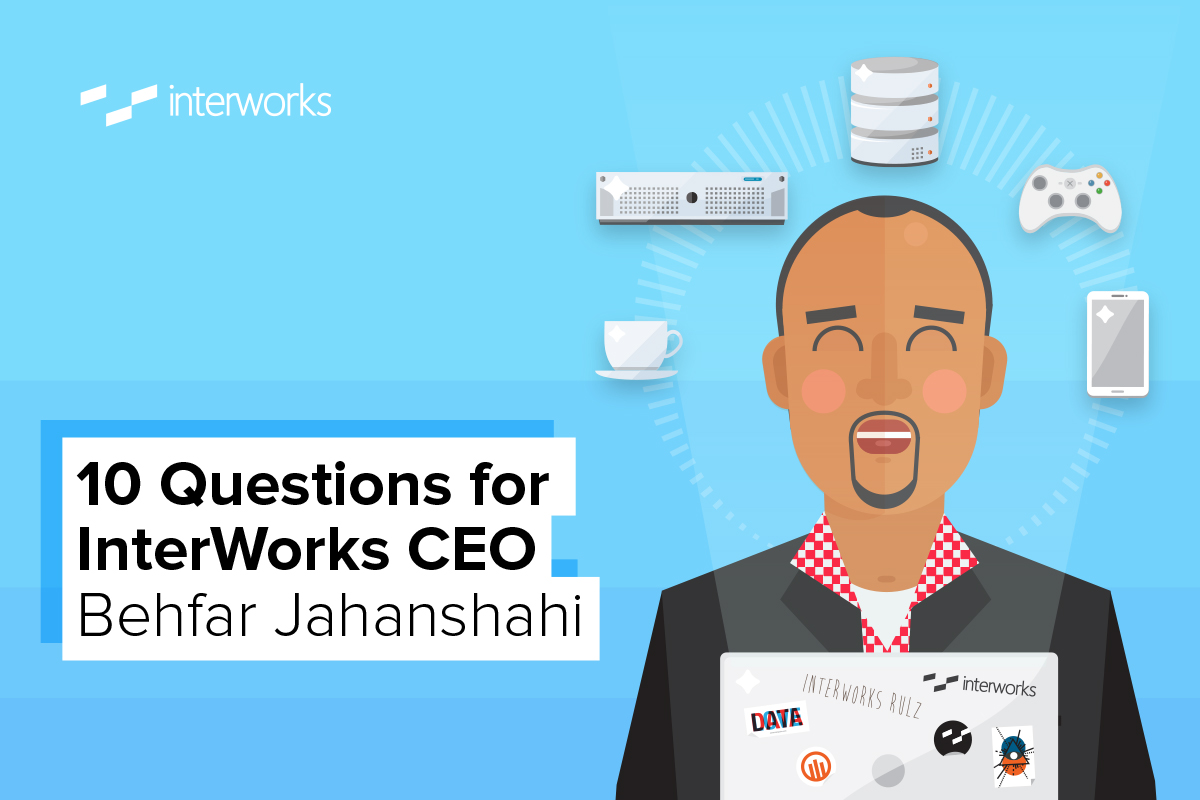10 Questions is an ongoing blog series in which Tableau Zen Master Dan Murray interviews some of the brightest folks in the world of data.

I met Behfar for the first time around 2005. At the time, I was the CFO/CIO for a mid-sized global manufacturing and distribution business. We has just finished divesting our parent company, and most of my team and I had to find technology partners that could handle our IT infrastructure and support needs globally. Driving through Oklahoma, a member of my team told me to detour and check out this consulting company in Stillwater that had just finished addressing a technology problem in minutes that our in-house staff had spent days trying (unsuccessfully) to sort out. At the time, InterWorks had around 12 employees. That’s when I met Behfar, Staci and Daniel Holm for the first time.
The Questions
Q: When did you first get interested in technology and why?
Jahanshahi: I have three distinct memories growing up that really pushed me into technology:
I’ve always loved technology. This love was passed down to me by my dad and uncle. When I was in the second grade, my father bought me a Commodore VIC-20. If I wanted to play any games, they had to be programmed using BASIC. We bought a book called “ZAP! POW! BOOM!” I devoured the entire book and typed all the code into the Commodore, saving each game onto tape. I had a lot of fun doing this and, in the process, picked up coding.
In junior high (late 80s) my uncle and dad helped me assemble our first home computer. We had to purchase all the parts separately and put them together. It was a fun process and I learned a lot along the way.
My parents both worked at Oklahoma State University, which was less than a mile from our apartment. I used to ride my bike there and spend time in the computer lab installing and playing video games. At that time, the computer lab had an IBM PCjr and a 286 computer. I learned MS-DOS, Windows 3.1 and the art of altering files to optimize RAM usage for gaming.
I’ve always had a knack and appreciation for technology, and it’s always been a hobby and passion of mine.
Q: What did you study in college?
Jahanshahi: I got a bachelors in MSIS (management sciences information systems) in 1998 and a masters in telecommunications management in 2000.
Q: Was starting a business always something you planned to do, or did InterWorks happen by accident?
Jahanshahi: I never gave it much thought. I enjoyed setting up computer networks, and that was largely driven by the need to set up computer networks so my buddies and I could have LAN parties and play video games. After doing this weekend after weekend, I realized that I loved doing the set up as much as I enjoyed playing the games.
I approached some local computer shops that were in the business of building computers, and I asked them to send me all of their services work for the businesses they support. They were happy to wash their hands of it, and I was happy to take on the services.
InterWorks was born in 1996, my sophomore year in school. For me, it seemed like the natural next step and wasn’t a decision I had to dwell on. In my mind, when I graduated, I was going to work for IBM or Boeing (building the space station). Once I actually graduated though, and in participating in the corporate interview process, I realized I was already where I wanted to be, and InterWorks became “serious” in 2000.
Q: How did you get connected with my previous employer?
Jahanshahi: There was a guy we subcontracted on behalf of InterWorks to make cold calls. He ended up getting someone on the phone in IT who was based out of Atlanta who said they had an immediate issue in Oklahoma City that needed attention.
I drove right over, fixed them up and called Sandy to let her know the issue was resolved. She was surprised to hear that because she said it was an issue they had been working on for days. That ultimately led to a larger conversation about a supporting role in an upcoming transaction where the parent company was selling off several pieces, and someone needed to come in and deal with the IT side. That’s when I was introduced to you, Dan. And the rest is history.
Q: What caused you to be an early believer in Tableau?
Jahanshahi: I remember this moment well. You had been hounding me for weeks (if not longer) to look into Tableau. I remember being at my in-laws on Christmas Eve. I had the laptop on the recliner and decided to go download a free trial of the tool. Within ten minutes and with no training or previous exposure, I was building visualizations against our “time entry” SQL database.
I was blown away with how easy it was to use a tool like Tableau. I had previously worked with Crystal Reports, ACCESS and SQL reporting and realized this was game changer.
Q: I was probably a pretty risky hire for InterWorks. What caused you to take that bet?
Jahanshahi: We hit a size at InterWorks where we needed someone to come in and start paying attention to the business. I was more interested in architecture, technology and being hands on. With your previous experience as COO/CFO and your knowledge of InterWorks, it seemed like a great match.
Q: How do you find and evaluate talent?
Jahanshahi: Our interview process goes something like this:
- Phone screen
- Multiple tech screens
- Interview with operations
- Interview with at least one or two principals
- Presentation
- Final interview with Staci and I
For those that make it to the final interview, they find there are many open-ended questions. The idea is to give people an opportunity to talk and share their story. What motivates a person? What have they enjoyed about previous jobs? What have they not enjoyed? Does this person display some level of passion? When I come to work at 8 a.m. on a Monday, is this person someone i’m proud to work with or are they just a warm body? The final question we always have and ask … “Is this person a ‘hell yes’ from a culture fit stand point? If the answer is not ‘hell yes’ it’s ‘NO.'”
What qualities do you feel make the ideal InterWorks consultant?
Q: What qualities do you feel make the ideal InterWorks consultant?
Jahanshahi:
- Curiousity
- Autonomy
- Resourcefulness
- A hunger to learn
- Passion
Q: How would you describe the InterWorks culture?
Jahanshahi: Amazing. Everyone here is happy to help their fellow teammates, clients and community members. Everyone here is eager to learn and accept new challenges. Everyone here is passionate about their craft and wants to be the best at it. People start businesses for all sorts of reasons. For me, it was simply about doing what I love. I can’t love what I’m doing if I’m not surrounded by people who share that same commitment and passion that I have. This has helped foster the culture we have today, and we’re incredibly proud of it. People looking from the outside in regularly comment on the culture and know we’ve created something special.
Q: Looking forward five years: What does the the technology landscape look like, and how do you think InterWorks will continue to add value?
Jahanshahi: The expectation of the everyday technology user has changed drastically over the last decade. You can thank Apple and their amazing attention to detail and UI for that. It’s been to everyone’s benefit. Take a tool like Tableau, which takes the traditionally boring topic of “enterprise reporting,” and they’ve made it fun, sexy and easy. The bar has been raised across the board, and any software solutions provider will be expected to create tools that are intuitive, easy-to-use and simple.
I also believe you’ll see the worlds of IT and data converge. Take up-and-comer DataGravity as an example. They’re taking the traditional SAN (storage area network) and building in analytical capability into the device. This means that everyday users will be able to open a file, look at who the collaboraters are on that file and run all sorts of analytics against the SAN – all via a simple, easy-to-use GUI.
Tools like Alteryx take ETL (a buzzword traditionally reserved for the computer science major sitting in a cube in the back room) and enable business power users to easily take and blend data together.
It’s an exciting time to be in technology. InterWorks doesn’t focus on long-term engagements or landing an army of consultants; we focus on empowering and enabling others. It lends itself well to rapid iteration in the software and hardware space, and we can quickly train and enable business users to use whatever new amazing products that may come out in the future.
Discover More Interviews
Want to read more insightful interviews like this one? Then you’ll love our 10 Questions blog series. Check out the full list of interviews here, and stay tuned for new additions.
Need Help? Let Us Know!
There you have it. If you need help with your data infrastructure or Tableau, we have the experience, skill, and knowledge to insure your success. Contact us today to learn more.
If you’re in college and think you might want to get into this game, head to our Careers page and apply for one of our open jobs. We’d love to hear from you.

